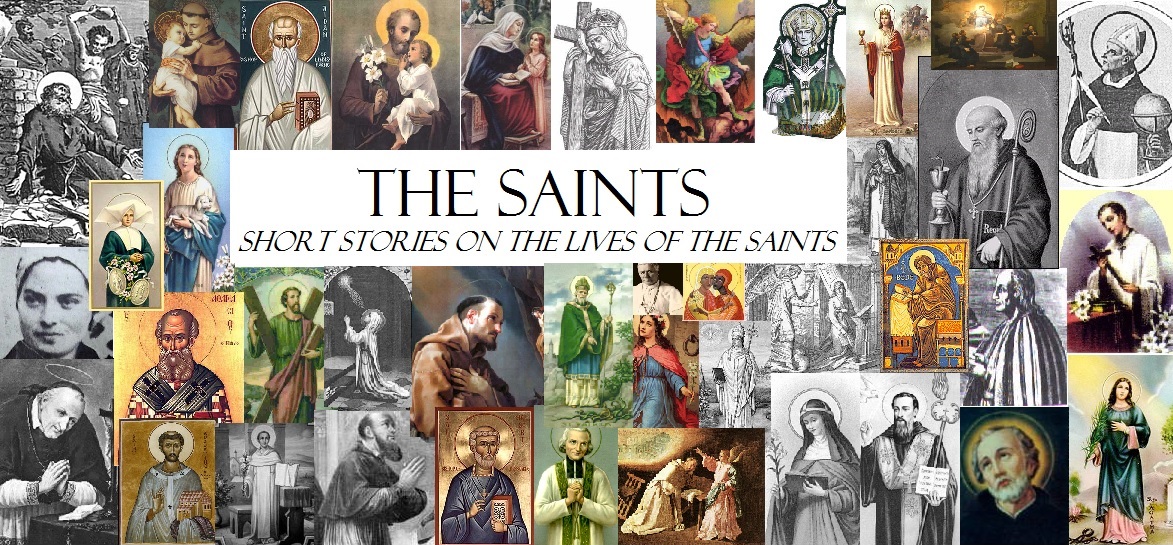Sts. Romanus and Lupicinus - February 28th
St. Romanus was a French youth who was admired by everyone for his goodness. He had a great desire to become a saint. Since he saw that in the world there are many dangers for our soul’s salvation, he decided to go to live alone with God. First, he asked advise of a holy monk, and then he started off. He took with him two books on the lives of the saints. Living by himself, he thought continually about God, and praised and thanked Him.
Soon afterwards, his brother Lupicinus joined him. Romanus and Lupicinus were very different in their ways. Romanus was very hard on himself but very kind and gentle and full of understanding with others. Lupicinus was hard and severe with himself and with everybody else, too. Yet they got along perfectly.
When many men came to join them, they built two monasteries. Romanus governed one and Lupicinus governed the other.
They prayed much and did much penance. They worked very hard, kept silent all the time, and were concerned only about becoming Saints.
St. Romanus and St. Lupicinus were both Saints, even though they were so different. We should learn never to dislike anyone, for everyone has many good qualities.

Search This Blog
2/28/08
2/27/08
St. Gabriel of Our Lady of Sorrows
St. Gabriel of Our Lady of Sorrows - Patron of Clerics and Youth - February 27th
This lovable Saint was born at Assisi and received the name Francis at Baptism, in honor of the great St. Francis of Assisi. His mother died when he was only four. Francis’ father sent for a governess to raise him and the other children.
Francis grew to be a very handsome, likeable boy, who was the most popular dancer at all the parties. He really loved to have fun, but he was a good boy and even while having good times, he felt bored. He felt in his heart a strong desire for the things of God. Twice when he became so sick that he nearly died, he promised Our Lady that if she obtained his cure, he would become a religious. He did get better both times, but he did not keep his promise.
One day, afterwards, as he looked at a picture of the Sorrowful Mother being carried in a procession, it seemed to him that the Blessed Mother looked at him. At the same time, he felt something like a voice in his heart telling him: “Francis, the world is not for you any more.”
That did it. Francis entered the Passionist monastery. He was only eighteen. The name he took was Gabriel of the Sorrowful Mother.
Gabriel’s three great loves were the Passion of Our Lord, the Blessed Sacrament and our Sorrowful Mother.
He practiced two virtues in a special way: humility and obedience. In just six years, Gabriel became a saint.
We should not think only of having good times. God made us for Heaven. So we should often think of the great joys awaiting us there, if we live a life pleasing to God.
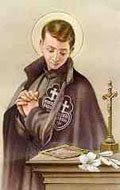
This lovable Saint was born at Assisi and received the name Francis at Baptism, in honor of the great St. Francis of Assisi. His mother died when he was only four. Francis’ father sent for a governess to raise him and the other children.
Francis grew to be a very handsome, likeable boy, who was the most popular dancer at all the parties. He really loved to have fun, but he was a good boy and even while having good times, he felt bored. He felt in his heart a strong desire for the things of God. Twice when he became so sick that he nearly died, he promised Our Lady that if she obtained his cure, he would become a religious. He did get better both times, but he did not keep his promise.
One day, afterwards, as he looked at a picture of the Sorrowful Mother being carried in a procession, it seemed to him that the Blessed Mother looked at him. At the same time, he felt something like a voice in his heart telling him: “Francis, the world is not for you any more.”
That did it. Francis entered the Passionist monastery. He was only eighteen. The name he took was Gabriel of the Sorrowful Mother.
Gabriel’s three great loves were the Passion of Our Lord, the Blessed Sacrament and our Sorrowful Mother.
He practiced two virtues in a special way: humility and obedience. In just six years, Gabriel became a saint.
We should not think only of having good times. God made us for Heaven. So we should often think of the great joys awaiting us there, if we live a life pleasing to God.

2/26/08
St. Porphyry
St. Porphyry - February 26th
Born of a wealthy and noble parents, Porphyry left his family when he was twenty-five. He went to Egypt to enter a monastery. After five years, he made a trip to Jerusalem to visit the places where Jesus had been when He was on earth.
Porphyry love the poor. He sold everything he had in order to help those in need.
At the age of forty he became a priest and was given care of the relics of the true Cross of Jesus.
When Porphyry was made bishop of Gaza, he worked as hard as he could to convert the pagans and stop the many pagan practices and superstitions.
Although he was able to stop many of these practices, he had to suffer very much from his enemies.
Let us have nothing to do with foolish superstitions. There is no such thing as good luck from charms or bad luck from numbers, and other such things. God watches over us and gives us all the help we need, if we pray.
Born of a wealthy and noble parents, Porphyry left his family when he was twenty-five. He went to Egypt to enter a monastery. After five years, he made a trip to Jerusalem to visit the places where Jesus had been when He was on earth.
Porphyry love the poor. He sold everything he had in order to help those in need.
At the age of forty he became a priest and was given care of the relics of the true Cross of Jesus.
When Porphyry was made bishop of Gaza, he worked as hard as he could to convert the pagans and stop the many pagan practices and superstitions.
Although he was able to stop many of these practices, he had to suffer very much from his enemies.
Let us have nothing to do with foolish superstitions. There is no such thing as good luck from charms or bad luck from numbers, and other such things. God watches over us and gives us all the help we need, if we pray.
2/25/08
St. Walburga
St. Walburga - February 25th
St. Walburga came from a family of Saints. Her father was St. Richard. Her brothers were St. Willibald and St. Winebald. She herself entered the convent after she had finished her education.
St. Walburga’s brother went with St. Boniface to the convert Germany.
Later Her brother founded a monastery with two houses, one for monks and the other for sisters. St. Walburga was asked to take care of the sisters while her brother took care of the monks. After his death, St. Walburga took care of both.
The pagan greatly admired these holy women who worked so hard on their convent farms. They listened to what the monks and nuns taught them about Christ, because they saw what holy lives they were living. Besides all her other duties, St. Walburga also took care of the pagans when they fell sick.
When she, too, went to Heaven, she was buried beside her brother.
Let us offer prayers and sacrifices so that everyone in our family may live as good Christians and save their souls.
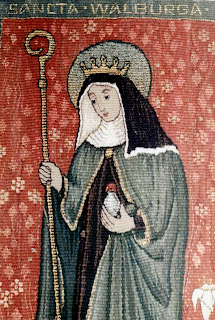
St. Walburga came from a family of Saints. Her father was St. Richard. Her brothers were St. Willibald and St. Winebald. She herself entered the convent after she had finished her education.
St. Walburga’s brother went with St. Boniface to the convert Germany.
Later Her brother founded a monastery with two houses, one for monks and the other for sisters. St. Walburga was asked to take care of the sisters while her brother took care of the monks. After his death, St. Walburga took care of both.
The pagan greatly admired these holy women who worked so hard on their convent farms. They listened to what the monks and nuns taught them about Christ, because they saw what holy lives they were living. Besides all her other duties, St. Walburga also took care of the pagans when they fell sick.
When she, too, went to Heaven, she was buried beside her brother.
Let us offer prayers and sacrifices so that everyone in our family may live as good Christians and save their souls.

2/24/08
St. Matthias the Apostle
St. Matthias the Apostle - February 24th
St. Matthias was one of Our Lord’s seventy-two disciples. He was good and pure as a boy and as a young man. So when he met Jesus, he was attracted to Him and followed Him.
He was with Our Lord during His whole public life.
After Jesus had gone back to Heaven, the eleven Apostles met together to choose another to take the place of Judas the traitor. They prayed to God to show them whom He had chosen. Then they cast lots and Matthias was the was the one chosen. He received the Holy Ghost with the other Apostles.
St. Matthias was a very good Apostle and preached the Word of God to many people. At last the enemies of Jesus grew furious to see how people listened to Matthias that they put him to death. The Martyr thanked Jesus for letting him die for Him, and then he prayed for his enemies.
Matthias had lived a very holy life and Jesus welcomed his faithful Apostle into the joys of Heaven.
Every morning, let us ask Jesus to give us the grace of living and dying faithful to Him.
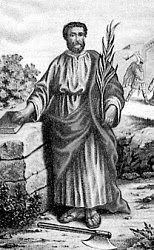
St. Matthias was one of Our Lord’s seventy-two disciples. He was good and pure as a boy and as a young man. So when he met Jesus, he was attracted to Him and followed Him.
He was with Our Lord during His whole public life.
After Jesus had gone back to Heaven, the eleven Apostles met together to choose another to take the place of Judas the traitor. They prayed to God to show them whom He had chosen. Then they cast lots and Matthias was the was the one chosen. He received the Holy Ghost with the other Apostles.
St. Matthias was a very good Apostle and preached the Word of God to many people. At last the enemies of Jesus grew furious to see how people listened to Matthias that they put him to death. The Martyr thanked Jesus for letting him die for Him, and then he prayed for his enemies.
Matthias had lived a very holy life and Jesus welcomed his faithful Apostle into the joys of Heaven.
Every morning, let us ask Jesus to give us the grace of living and dying faithful to Him.

2/23/08
St. Serenus
St. Serenus - February 23rd
St. Serenus was a Greek who left all his belongings and went to Yugoslavia to live a holy life. He lived alone and grew just enough fruit and vegetables to live on.
One night he awoke to hear someone in his garden. Getting up to find out who it was, he saw a women and asked her what she was doing. She answered that she liked to walk in his garden.
But St. Serenus knew that she was a bad women and he told her to leave. The lady was very angry when she left. She went to her husband, who was one of the Emperor Maximian’s guards. She told him that Serenus had insulted her.
Her husband believed the lie and wrote to the governor of the land to punish Serenus.
When the governor called Serenus, he found out that it was really the women who was evil. Not Serenus. Just as the Saint was about to be freed, someone said to the governor that such a holy man might be a Christian. At that time, the Christians were being persecuted. The governor asked Serenus if he were a Christian. Serenus was happy to declare his faith in Jesus and to have the privilege of dying a martyr.
If we have any friends who are not good, we will not go with them any more. It is better to be alone than to be with bad companions.
St. Serenus was a Greek who left all his belongings and went to Yugoslavia to live a holy life. He lived alone and grew just enough fruit and vegetables to live on.
One night he awoke to hear someone in his garden. Getting up to find out who it was, he saw a women and asked her what she was doing. She answered that she liked to walk in his garden.
But St. Serenus knew that she was a bad women and he told her to leave. The lady was very angry when she left. She went to her husband, who was one of the Emperor Maximian’s guards. She told him that Serenus had insulted her.
Her husband believed the lie and wrote to the governor of the land to punish Serenus.
When the governor called Serenus, he found out that it was really the women who was evil. Not Serenus. Just as the Saint was about to be freed, someone said to the governor that such a holy man might be a Christian. At that time, the Christians were being persecuted. The governor asked Serenus if he were a Christian. Serenus was happy to declare his faith in Jesus and to have the privilege of dying a martyr.
If we have any friends who are not good, we will not go with them any more. It is better to be alone than to be with bad companions.
2/22/08
St. Margaret of Cortona
St. Margaret of Cortona - February 22nd
Little Margaret was only eight when her mother died. Her father married another women, who treated her harshly.
At the age of sixteen, Margaret met a rich young man, who was struck by her beauty. He told her that he loved her. The poor girl was unhappy at home and she wanted to be loved. She wanted a grand house instead of a poor cottage. She thought it would be so nice to wear beautiful gowns and jewels instead of ragged clothes. She went off with the nobleman.
Although she now had the things she wanted, Margaret was never really happy. Deep down in her heart she felt bad because she was leading a life of sin.
One day, the nobleman was killed in the woods. His dog came home and led Margaret to the place where he lay. As she looked down on his body, she realized that if she did not change her sinful life she might one day die without God’s grace. That terrible sight made such an impression on her that then and there, at only twenty-five years of age, she made up her mind to change. She confessed her sins and did penance for the rest of her life. To make up for the bad example she had given, she once put a rope around her neck and begged forgiveness to everyone in her parish church.
Her father and stepmother would not let her live in her home, but Margaret put all her trust in her heavenly Father. She started a hospital for the sick poor and served there herself. She brought many souls to God by her good example.
If we have given bad example, we should ask God’s pardon. Then let us make up for our faults by kind words and good deeds.
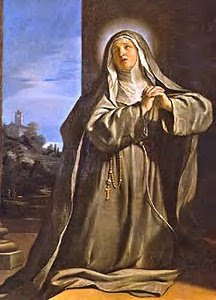
Little Margaret was only eight when her mother died. Her father married another women, who treated her harshly.
At the age of sixteen, Margaret met a rich young man, who was struck by her beauty. He told her that he loved her. The poor girl was unhappy at home and she wanted to be loved. She wanted a grand house instead of a poor cottage. She thought it would be so nice to wear beautiful gowns and jewels instead of ragged clothes. She went off with the nobleman.
Although she now had the things she wanted, Margaret was never really happy. Deep down in her heart she felt bad because she was leading a life of sin.
One day, the nobleman was killed in the woods. His dog came home and led Margaret to the place where he lay. As she looked down on his body, she realized that if she did not change her sinful life she might one day die without God’s grace. That terrible sight made such an impression on her that then and there, at only twenty-five years of age, she made up her mind to change. She confessed her sins and did penance for the rest of her life. To make up for the bad example she had given, she once put a rope around her neck and begged forgiveness to everyone in her parish church.
Her father and stepmother would not let her live in her home, but Margaret put all her trust in her heavenly Father. She started a hospital for the sick poor and served there herself. She brought many souls to God by her good example.
If we have given bad example, we should ask God’s pardon. Then let us make up for our faults by kind words and good deeds.

2/21/08
St. Dositheus
St. Dositheus - February 21st
The Saint was the son of a Roman general, who gave him whatever he wanted. Dositheus was tall and handsome, he lived a life of fun in his rich house. He knew nothing about religion. One day he decided to go with some officers on a trip to Jerusalem. There he saw where Jesus had walked and preached and suffered. In one church he also saw a picture representing Hell.
“What is that?” he asked. When he found out, what torments the damned souls suffer there, he could not get it out of his mind. He began to pray and to live a holy life. His friends could not believe their eyes! “You are living like a monk in a monastery!” one said. Dositheus wondered what a monastery was. At last, to please him, they took him to the monastery where St. Seridon was the abbot. Dositheus asked to be allowed to enter, because he said he wanted to save his soul.
As a monk, Dositheus obeyed perfectly. He did whatever he was told and grew holier every day. Once, to test him, his director had him make a habit for himself and then told him to give it to another. Three or four times he did that. Yet St. Dositheus did not complain once.
Only five years did this young man live as a monk. When he was just twenty-two, he caught a very bad sickness, which soon took his life. He had not been able to do great penances either, because of his poor health. Yet, he became a Saint in that short time by obeying perfectly.
Let us try to imitate St. Dositheus by obeying quickly and cheerfully always. Whoever obeys is sure of doing what God wants.
The Saint was the son of a Roman general, who gave him whatever he wanted. Dositheus was tall and handsome, he lived a life of fun in his rich house. He knew nothing about religion. One day he decided to go with some officers on a trip to Jerusalem. There he saw where Jesus had walked and preached and suffered. In one church he also saw a picture representing Hell.
“What is that?” he asked. When he found out, what torments the damned souls suffer there, he could not get it out of his mind. He began to pray and to live a holy life. His friends could not believe their eyes! “You are living like a monk in a monastery!” one said. Dositheus wondered what a monastery was. At last, to please him, they took him to the monastery where St. Seridon was the abbot. Dositheus asked to be allowed to enter, because he said he wanted to save his soul.
As a monk, Dositheus obeyed perfectly. He did whatever he was told and grew holier every day. Once, to test him, his director had him make a habit for himself and then told him to give it to another. Three or four times he did that. Yet St. Dositheus did not complain once.
Only five years did this young man live as a monk. When he was just twenty-two, he caught a very bad sickness, which soon took his life. He had not been able to do great penances either, because of his poor health. Yet, he became a Saint in that short time by obeying perfectly.
Let us try to imitate St. Dositheus by obeying quickly and cheerfully always. Whoever obeys is sure of doing what God wants.
2/20/08
St. Eucherius
St. Eucherius - February 20th
St. Eucherius was born at Orleans, France. Every day his mother would offer him to God, and he was given a very good education. A sentence from the letters of St. Paul made a big change in him. The sentence was: “This world, as we see it, is passing away.” It made him realize that our lives on this earth are very short and that Heaven and Hell last forever. He decided then and there to earn the joys of Heaven by living for God alone.
So Eucherius left his rich home and entered the Benedictine Abbey. There he spent seven years in close union with God.
After the death of his uncle, the Bishop of Orleans, he was chosen to take his place as Bishop. Eucherius was then only twenty-five and he was very humble. He did not want to leave his beloved Abbey. With tears, he begged to be allowed to remain alone with God in the monastery. But finally, he gave in for love of obedience. Eucherius became a holy, wise Bishop and did much good to his priests and to his people.
Charles Martel, who was Mayor of the Palace, used to take some of the Church’s money to use for war. Because Bishop Eucherius told him that was wrong, Charles had him taken prisoner.
But the governor in whose charge he put him was so moved by Eucherius’ meekness toward his enemies that some time later, he sent him back to a monastery.
Here, the Saint spent all his time in prayer until his death.
Let us, too, remember what St. Paul says: “This world is passing away,” and try to think more of Heaven.
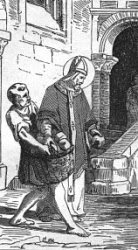
St. Eucherius was born at Orleans, France. Every day his mother would offer him to God, and he was given a very good education. A sentence from the letters of St. Paul made a big change in him. The sentence was: “This world, as we see it, is passing away.” It made him realize that our lives on this earth are very short and that Heaven and Hell last forever. He decided then and there to earn the joys of Heaven by living for God alone.
So Eucherius left his rich home and entered the Benedictine Abbey. There he spent seven years in close union with God.
After the death of his uncle, the Bishop of Orleans, he was chosen to take his place as Bishop. Eucherius was then only twenty-five and he was very humble. He did not want to leave his beloved Abbey. With tears, he begged to be allowed to remain alone with God in the monastery. But finally, he gave in for love of obedience. Eucherius became a holy, wise Bishop and did much good to his priests and to his people.
Charles Martel, who was Mayor of the Palace, used to take some of the Church’s money to use for war. Because Bishop Eucherius told him that was wrong, Charles had him taken prisoner.
But the governor in whose charge he put him was so moved by Eucherius’ meekness toward his enemies that some time later, he sent him back to a monastery.
Here, the Saint spent all his time in prayer until his death.
Let us, too, remember what St. Paul says: “This world is passing away,” and try to think more of Heaven.

2/19/08
St. Barbatus
St. Barbatus - February 19th
St. Barbatus was born in Italy. He was given a Christian education and was a very good and devout boy. What he liked the most to do was to read the Holy Bible. As soon as he was old enough he was ordained a priest and later made pastor. But some of the people did not like him to tell them that they must lead better lives and be sorry for their sins. So they persecuted him and obliged him to leave.
St. Barbatus went back to Benevento, where he was born. There he was received with great joy.. Many people in this city were converts to Christianity, but they still kept pagan idols in their homes. And they still believed that these idols had magic powers. St. Barbatus preached against this custom, but the people did not want to give up the false gods. The Saint told them that because of this sin, their city would be attacked by their enemies, and it was.
Afterwards, the people gave up their error and peace returned. St Barbatus was made Bishop and continued his work to convert his people.
Our parish priests, like St. Barbatus, want us to be good so that we will go to heaven. Let us listen to their advice and follow it.
St. Barbatus was born in Italy. He was given a Christian education and was a very good and devout boy. What he liked the most to do was to read the Holy Bible. As soon as he was old enough he was ordained a priest and later made pastor. But some of the people did not like him to tell them that they must lead better lives and be sorry for their sins. So they persecuted him and obliged him to leave.
St. Barbatus went back to Benevento, where he was born. There he was received with great joy.. Many people in this city were converts to Christianity, but they still kept pagan idols in their homes. And they still believed that these idols had magic powers. St. Barbatus preached against this custom, but the people did not want to give up the false gods. The Saint told them that because of this sin, their city would be attacked by their enemies, and it was.
Afterwards, the people gave up their error and peace returned. St Barbatus was made Bishop and continued his work to convert his people.
Our parish priests, like St. Barbatus, want us to be good so that we will go to heaven. Let us listen to their advice and follow it.
2/18/08
St. Bernadette
St. Bernadette - February 18th
St. Bernadette was born at Lourdes, France. Her parents were very poor and she herself was in poor health.
One Thursday, February 11, 1858, when she was sent with her younger sister and a friend to gather firewood, a very beautiful Lady appeared to her above a rosebush in a grotto called Massabielle. The lovely Lady was dressed in blue and white. She smiled at Bernadette and then made the sign of the cross with a rosary of ivory and gold. Bernadette fell on her knees, took out her own rosary and began to say it.
The beautiful Lady was God’s Mother, the Blessed Virgin Mary. She appeared to Bernadette seventeen other times and spoke with her. She told Bernadette that she should pray for sinners, do penance and have a chapel built there in her honor.
Many people did not believe Bernadette when she spoke of her vision. She had to suffer much. But one day Our Lady told Bernadette to dig in the mud. As she did, a spring of water began to flow. The next day it continued to grow larger and larger. Many miracles happened when people began to use this water.
When Bernadette was older, she became a sister. She was always very humble. More than anything else, she desired not to be praised. Once a sister asked her if she had temptations of pride because she was favored by the Blessed Mother. “How can I?” she answered quickly. “The Blessed Virgin chose me only because I was the most ignorant.” What humility!
Today let us pray to Our Lady and make some little sacrifices for the conversion of sinners.
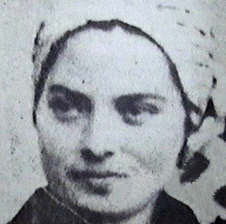
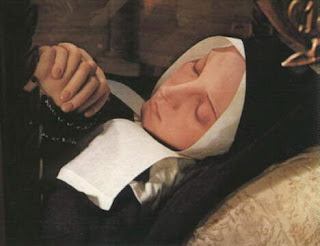
St. Bernadette was born at Lourdes, France. Her parents were very poor and she herself was in poor health.
One Thursday, February 11, 1858, when she was sent with her younger sister and a friend to gather firewood, a very beautiful Lady appeared to her above a rosebush in a grotto called Massabielle. The lovely Lady was dressed in blue and white. She smiled at Bernadette and then made the sign of the cross with a rosary of ivory and gold. Bernadette fell on her knees, took out her own rosary and began to say it.
The beautiful Lady was God’s Mother, the Blessed Virgin Mary. She appeared to Bernadette seventeen other times and spoke with her. She told Bernadette that she should pray for sinners, do penance and have a chapel built there in her honor.
Many people did not believe Bernadette when she spoke of her vision. She had to suffer much. But one day Our Lady told Bernadette to dig in the mud. As she did, a spring of water began to flow. The next day it continued to grow larger and larger. Many miracles happened when people began to use this water.
When Bernadette was older, she became a sister. She was always very humble. More than anything else, she desired not to be praised. Once a sister asked her if she had temptations of pride because she was favored by the Blessed Mother. “How can I?” she answered quickly. “The Blessed Virgin chose me only because I was the most ignorant.” What humility!
Today let us pray to Our Lady and make some little sacrifices for the conversion of sinners.


2/17/08
St. Gerard Majella
St. Gerard Majella - Patron of Childbirth - February 17th
As a young boy, Gerard showed his love for Jesus by doing all he could to help the poor. He went to work so that he would have money to buy them food and clothes. Once he gave a beggar a brand new suit he himself really needed.
Gerard dearly loved Jesus in the Blessed Sacrament and the Blessed Virgin Mary. He wanted to become a religious to serve them all his life. But he had a very hard time trying to enter a religious life, because he was sickly. Besides that, his mother and his sisters absolutely did not want him to go. Still he kept trying. At last he was accepted as a brother in the Redemptorist Order.
“Let me do it! I am the youngest,” Brother Gerard would say whenever there was hard lowly work to be done. Everyone loved and admired this good, humble brother.
“I want only what God wants for me,” St. Gerard often exclaimed. And he was happy when he had something to suffer for Jesus.
Whoever is called to become a priest, a brother, or a sister should trust in God and follow his vocation, no matter how hard a time he has.
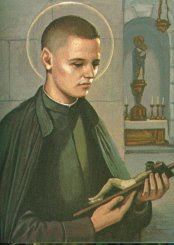
As a young boy, Gerard showed his love for Jesus by doing all he could to help the poor. He went to work so that he would have money to buy them food and clothes. Once he gave a beggar a brand new suit he himself really needed.
Gerard dearly loved Jesus in the Blessed Sacrament and the Blessed Virgin Mary. He wanted to become a religious to serve them all his life. But he had a very hard time trying to enter a religious life, because he was sickly. Besides that, his mother and his sisters absolutely did not want him to go. Still he kept trying. At last he was accepted as a brother in the Redemptorist Order.
“Let me do it! I am the youngest,” Brother Gerard would say whenever there was hard lowly work to be done. Everyone loved and admired this good, humble brother.
“I want only what God wants for me,” St. Gerard often exclaimed. And he was happy when he had something to suffer for Jesus.
Whoever is called to become a priest, a brother, or a sister should trust in God and follow his vocation, no matter how hard a time he has.

2/16/08
St. Onesimus
St. Onesimus - February 16th
St. Onesimus was a slave who robbed his master and ran away to Rome. In Rome he went to see the great Apostle St. Paul, who was a prisoner for his Faith. Paul received Onesimus with fatherly love, made him realize he had done wrong, and converted him to the Faith.
After Onesimus’ conversion, St. Paul sent him back to his master, Philemon, who was the Apostle’s friend. He sent Philemon a letter, in which he wrote: “I plead with you for my own son, for Onesimus…. I am sending him back to you. Welcome him as though he were my very heart.”
Onesimus returned home and was set free. Later, he went back to St. Paul and became his faithful helper.
St. Paul made Onesimus a priest and then Bishop of Ephesus. During the persecutions, he was brought in chains to Rome and there stoned to death.
If we ever should hurt anyone in any way, let us ask forgiveness right away. God will be pleased to see that we are sorry and He will bless us as He did Onesimus.

St. Onesimus was a slave who robbed his master and ran away to Rome. In Rome he went to see the great Apostle St. Paul, who was a prisoner for his Faith. Paul received Onesimus with fatherly love, made him realize he had done wrong, and converted him to the Faith.
After Onesimus’ conversion, St. Paul sent him back to his master, Philemon, who was the Apostle’s friend. He sent Philemon a letter, in which he wrote: “I plead with you for my own son, for Onesimus…. I am sending him back to you. Welcome him as though he were my very heart.”
Onesimus returned home and was set free. Later, he went back to St. Paul and became his faithful helper.
St. Paul made Onesimus a priest and then Bishop of Ephesus. During the persecutions, he was brought in chains to Rome and there stoned to death.
If we ever should hurt anyone in any way, let us ask forgiveness right away. God will be pleased to see that we are sorry and He will bless us as He did Onesimus.

2/15/08
Sts. Faustinus and Jovita
Sts. Faustinus and Jovita - Patrons of the city of Brescia - February 15th
Sts. Faustinus and Jovita were brothers who lived in Brescia, Italy. From the time they were young, they were famous for their great love for their religion and their works of Christian charity. Never were there two brothers so closely united in zeal for doing good. The bishop of their city made them both priests, and they began to preach everywhere to both the rich and the poor. They spared themselves no sacrifice to bring many to God. They were not afraid of the soldiers, who were putting many Christians to death.
When the Emperor heard that Faustinus and Jovita were preaching openly, he sent them to prison and had them tortured greatly. Yet, no matter what the soldiers made them suffer, Faustinus and Jovita prayed and willingly suffered for the Lord. They would not give up their Faith.
How pleased God is to see brothers and sisters helping one another study their Catechism! May He be pleased with this sight in their home.
Sts. Faustinus and Jovita were brothers who lived in Brescia, Italy. From the time they were young, they were famous for their great love for their religion and their works of Christian charity. Never were there two brothers so closely united in zeal for doing good. The bishop of their city made them both priests, and they began to preach everywhere to both the rich and the poor. They spared themselves no sacrifice to bring many to God. They were not afraid of the soldiers, who were putting many Christians to death.
When the Emperor heard that Faustinus and Jovita were preaching openly, he sent them to prison and had them tortured greatly. Yet, no matter what the soldiers made them suffer, Faustinus and Jovita prayed and willingly suffered for the Lord. They would not give up their Faith.
How pleased God is to see brothers and sisters helping one another study their Catechism! May He be pleased with this sight in their home.
2/14/08
St. Valentine
St. Valentine - Patron of Lovers - February 14th
Valentine was a holy priest who lived in Rome. Along with St. Marius, he helped the martyrs to die a good and holy death. He gave them the Sacraments of Holy Communion and Extreme Unction to help them on their journey to Heaven.
While he was performing these holy deeds of charity, the Roman soldiers discovered him. But because St. Valentine was admired by all the people-and even by the Emperor-for his virtue and wisdom, he was not put to death at once. The Emperor himself sent for him and welcomed him kindly. He invited him to sit down beside him. Then he asked him, “Why did such a wise man as you lower yourself to join a religion that is against the gods of Rome?”
“Sir,” answered Valentine gently, “if you knew the God I adore, you would hate the religion that makes you worship devils. You would be proud to adore the only true God, the Creator of Heaven and earth. Only He can make you and all your people truly happy.”
The Emperor wanted to know more about the Christian religion, and St. Valentine answered all his questions with great wisdom. The people of the court became angry. They did not like to see their Emperor interested in the religion of the Christians. The Emperor saw that they were angry. He thought more about pleasing men than pleasing God. So he turned the Saint over to the governor to be judged. That is how St. Valentine, too, suffered martyrdom for his beloved Jesus. He was beaten with clubs and later beheaded.
St. Valentine was a man of great virtue because he knew his religion well. The more we learn about our Faith, the more we will want to grow in every virtue.

Valentine was a holy priest who lived in Rome. Along with St. Marius, he helped the martyrs to die a good and holy death. He gave them the Sacraments of Holy Communion and Extreme Unction to help them on their journey to Heaven.
While he was performing these holy deeds of charity, the Roman soldiers discovered him. But because St. Valentine was admired by all the people-and even by the Emperor-for his virtue and wisdom, he was not put to death at once. The Emperor himself sent for him and welcomed him kindly. He invited him to sit down beside him. Then he asked him, “Why did such a wise man as you lower yourself to join a religion that is against the gods of Rome?”
“Sir,” answered Valentine gently, “if you knew the God I adore, you would hate the religion that makes you worship devils. You would be proud to adore the only true God, the Creator of Heaven and earth. Only He can make you and all your people truly happy.”
The Emperor wanted to know more about the Christian religion, and St. Valentine answered all his questions with great wisdom. The people of the court became angry. They did not like to see their Emperor interested in the religion of the Christians. The Emperor saw that they were angry. He thought more about pleasing men than pleasing God. So he turned the Saint over to the governor to be judged. That is how St. Valentine, too, suffered martyrdom for his beloved Jesus. He was beaten with clubs and later beheaded.
St. Valentine was a man of great virtue because he knew his religion well. The more we learn about our Faith, the more we will want to grow in every virtue.

2/13/08
St. Catherine of Ricci
St. Catherine of Ricci - February 13th
Catherine was born of a famous family in Florence, Italy. At the age of thirteen, she entered the convent.
Even at that early age, Catherine had a deep love for the Passion of Jesus Christ. She used to think about Our Lord’s sufferings often, and Jesus gave her the great privilege of receiving in her own body the marks of His wounds. She was happy to accept all the sufferings of these wounds.
Catherine also felt very sorry for the Poor Souls in Purgatory. She prayed and did penance for them. Once God let her know that a certain man was in Purgatory. So great was her love that she offered to suffer for him. God listened to her prayer and she suffered greatly for forty days.
At the age of sixty-seven, after a very long and painful illness, St. Catherine joined Jesus, her Beloved Spouse in heaven.
Let us help the poor souls in Purgatory with our prayers, so that they may soon go to Heaven. When they are in Heaven, they will pray for us.
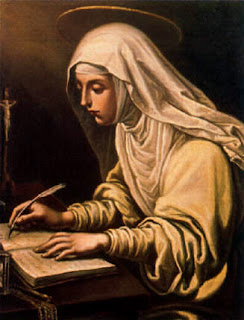
Catherine was born of a famous family in Florence, Italy. At the age of thirteen, she entered the convent.
Even at that early age, Catherine had a deep love for the Passion of Jesus Christ. She used to think about Our Lord’s sufferings often, and Jesus gave her the great privilege of receiving in her own body the marks of His wounds. She was happy to accept all the sufferings of these wounds.
Catherine also felt very sorry for the Poor Souls in Purgatory. She prayed and did penance for them. Once God let her know that a certain man was in Purgatory. So great was her love that she offered to suffer for him. God listened to her prayer and she suffered greatly for forty days.
At the age of sixty-seven, after a very long and painful illness, St. Catherine joined Jesus, her Beloved Spouse in heaven.
Let us help the poor souls in Purgatory with our prayers, so that they may soon go to Heaven. When they are in Heaven, they will pray for us.

2/12/08
Seven Holy Founders of the Servite Order
Seven Holy Founders of the Servite Order - February 12th
These seven Saints were all young men who lived in Florence, Italy. They had joined a Confraternity in honor of the Blessed Virgin because of their great devotion to her.
On the feast of the Assumption, while they were all deep in prayer, the Blessed Mother appeared to them and inspired them to leave the world and to live alone with God.
After several years of living by themselves, they went to the Bishop to ask for a rule of life. The Bishop told them that the matter was one which needed much prayer. The monks then went back to pray and ask Our Lady to let them know what to do. Mary appeared to them carrying a black habit. At her side was an angel bearing a scroll with the words “Servants of Mary” written on it. In the vision, the Blessed Mother said that she had chosen then to be her servants and to wear the black habit.
These seven wonderful men helped each other to love and serve God better. Together they became great Saints.
Many young men came to join these holy Founders. They were known as Servants of Mary, or Servites.
Like these seven Saints, let us love our Blessed Mother and ask her to help us in every need.
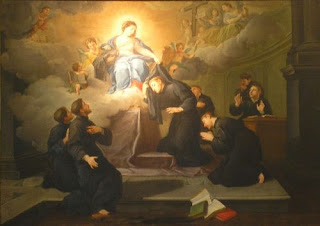
These seven Saints were all young men who lived in Florence, Italy. They had joined a Confraternity in honor of the Blessed Virgin because of their great devotion to her.
On the feast of the Assumption, while they were all deep in prayer, the Blessed Mother appeared to them and inspired them to leave the world and to live alone with God.
After several years of living by themselves, they went to the Bishop to ask for a rule of life. The Bishop told them that the matter was one which needed much prayer. The monks then went back to pray and ask Our Lady to let them know what to do. Mary appeared to them carrying a black habit. At her side was an angel bearing a scroll with the words “Servants of Mary” written on it. In the vision, the Blessed Mother said that she had chosen then to be her servants and to wear the black habit.
These seven wonderful men helped each other to love and serve God better. Together they became great Saints.
Many young men came to join these holy Founders. They were known as Servants of Mary, or Servites.
Like these seven Saints, let us love our Blessed Mother and ask her to help us in every need.

2/11/08
Our Lady of Lourdes
Our Lady of Lourdes - February 11th
It was on February 11, 1858, that the Blessed Mother first appeared to Bernadette Soubirous, a young girl of Lourdes, France. Bernadette was a sickly, little girl, whose family was so poor they lived in a cellar that had once been a jail. Even though she was fourteen years old, Bernadette could not read or write. She never could remember her catechism lessons, but she was a good girl who loved God very much. And even if her memory was bad, she kept trying hard to learn all she could about God. She was pure and obedient, too. It was to this young girl that our Blessed Mother appeared. The beautiful Lady Bernadette saw wore a white dress with a light blue sash. A white veil covered her head and fell over her shoulders to the ground. On her feet were two lovely golden roses. Her hands were joined and a Rosary hung from her right arm. Its chain and cross shone like gold. The lovely Lady encouraged Bernadette to say the Rosary.
The Blessed Mother appeared eighteen times to St. Bernadette and told her to tell the people to pray, to do penance and often to recite the Rosary for sinners. During the last apparition, Bernadette asked the beautiful Lady who she was. The Lady replied, “I am the Immaculate Conception.”
At Lourdes, miracles take place. Many people are cured of sicknesses. Crippled people walk again. Blind people see again. There, where she once appeared to St. Bernadette, Our Lady still shows her love for us.
Let us try to say the Rosary to our Blessed Mother every day. Through this prayer, we receive al the graces we need for ourselves and for those we love.

It was on February 11, 1858, that the Blessed Mother first appeared to Bernadette Soubirous, a young girl of Lourdes, France. Bernadette was a sickly, little girl, whose family was so poor they lived in a cellar that had once been a jail. Even though she was fourteen years old, Bernadette could not read or write. She never could remember her catechism lessons, but she was a good girl who loved God very much. And even if her memory was bad, she kept trying hard to learn all she could about God. She was pure and obedient, too. It was to this young girl that our Blessed Mother appeared. The beautiful Lady Bernadette saw wore a white dress with a light blue sash. A white veil covered her head and fell over her shoulders to the ground. On her feet were two lovely golden roses. Her hands were joined and a Rosary hung from her right arm. Its chain and cross shone like gold. The lovely Lady encouraged Bernadette to say the Rosary.
The Blessed Mother appeared eighteen times to St. Bernadette and told her to tell the people to pray, to do penance and often to recite the Rosary for sinners. During the last apparition, Bernadette asked the beautiful Lady who she was. The Lady replied, “I am the Immaculate Conception.”
At Lourdes, miracles take place. Many people are cured of sicknesses. Crippled people walk again. Blind people see again. There, where she once appeared to St. Bernadette, Our Lady still shows her love for us.
Let us try to say the Rosary to our Blessed Mother every day. Through this prayer, we receive al the graces we need for ourselves and for those we love.

2/10/08
St. Scholastica
St. Scholastica - Patroness against Convulsions in Children - February 10th
Scholastica was the twin sister of St. Benedict. For many years, her parents had begged God to send them children. When at last Benedict and Scholastica were born, their good mother did all she could to make them Saints.
Scholastica was a friendly, intelligent girl who promised herself to Jesus when she was still very young. Her parents died, she went to visit her holy brother. He had built a big monastery and was the leader of many good monks.
St. Benedict was very good to his holy sister. When he found out that she and other young women wanted to become religious, he helped her start her convent.
Once a year, St. Benedict came to visit her for one day. On one of his visits, when he was ready to leave the convent, Scholastica begged him to stay longer. Benedict said he could not, but Scholastica knew that soon she would die. So she bowed her head and prayed with all her heart. No sooner had she lifted her head than such a storm arose that Benedict was unable to leave. He stayed and they talked all through the night about the goodness of God and the happiness of the Saints in Heaven. Three days later, when St. Benedict was praying in his monastery, he saw the beautiful soul of his sister Scholastica going up to Heaven in the form of a dove.
Like this saintly brother and sister, let us love one another at home and be of good example to each other.
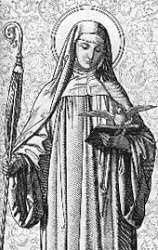
Scholastica was the twin sister of St. Benedict. For many years, her parents had begged God to send them children. When at last Benedict and Scholastica were born, their good mother did all she could to make them Saints.
Scholastica was a friendly, intelligent girl who promised herself to Jesus when she was still very young. Her parents died, she went to visit her holy brother. He had built a big monastery and was the leader of many good monks.
St. Benedict was very good to his holy sister. When he found out that she and other young women wanted to become religious, he helped her start her convent.
Once a year, St. Benedict came to visit her for one day. On one of his visits, when he was ready to leave the convent, Scholastica begged him to stay longer. Benedict said he could not, but Scholastica knew that soon she would die. So she bowed her head and prayed with all her heart. No sooner had she lifted her head than such a storm arose that Benedict was unable to leave. He stayed and they talked all through the night about the goodness of God and the happiness of the Saints in Heaven. Three days later, when St. Benedict was praying in his monastery, he saw the beautiful soul of his sister Scholastica going up to Heaven in the form of a dove.
Like this saintly brother and sister, let us love one another at home and be of good example to each other.

2/9/08
St. Apollonia and the Martyrs of Alexandria
St. Apollonia and the Martyrs of Alexandria - St. Apollonia, Patroness of Dentists - February 9th
In Alexandria, Egypt, during the reign of the Emperor Decius, there lived a holy virgin named Apollonia.
Apollonia had spent her whole life serving God. Now that she was growing old, she did not take time to rest. She bravely risked her life to comfort the Christians in prison when a persecution began.
“Remember that the suffering will not last long,” she would say. “But the joys of Heaven will last forever.”
At last Apollonia, too, was captured. When the judge asked her name, she courageously said, “I am a Christian and I love and serve the true God.”
Apollonia was made to suffer greatly because she would not give up her Faith. First, all her teeth were smashed and then pulled out. That is why we pray to St. Apollonia when we have a toothache. The Saint was then told that if she did not deny Christ, she would be thrown into the fire.
Apollonia was not afraid. She chose to die rather than sin.
When the pagans saw her heroic action, many of them were converted.
The martyrs greatly desired to shed their blood for Christ. And what do we do for Him? Are we strong enough to stand a little suffering for His love?

In Alexandria, Egypt, during the reign of the Emperor Decius, there lived a holy virgin named Apollonia.
Apollonia had spent her whole life serving God. Now that she was growing old, she did not take time to rest. She bravely risked her life to comfort the Christians in prison when a persecution began.
“Remember that the suffering will not last long,” she would say. “But the joys of Heaven will last forever.”
At last Apollonia, too, was captured. When the judge asked her name, she courageously said, “I am a Christian and I love and serve the true God.”
Apollonia was made to suffer greatly because she would not give up her Faith. First, all her teeth were smashed and then pulled out. That is why we pray to St. Apollonia when we have a toothache. The Saint was then told that if she did not deny Christ, she would be thrown into the fire.
Apollonia was not afraid. She chose to die rather than sin.
When the pagans saw her heroic action, many of them were converted.
The martyrs greatly desired to shed their blood for Christ. And what do we do for Him? Are we strong enough to stand a little suffering for His love?

2/8/08
St. John of Matha
St. John of Matha - February 8th
St. John of Matha was born in France. He was a happy, pure boy, who loved God and His Blesses Mother very much. His father sent him to school, and John did well in his studies. As he grew older, many people began coming to him for advice and counsel, and he decided to become a priest so that he could help them more.
When St. John said his first Mass, God showed him that he was to spend his life working to free Christians held as slaves by the Moslems. He founded an Order of priests called Trinitarians to help him in this mission.
St. John’s work was blessed by God, and many Christians were freed. Their Moslem owners were very angry with John. But he was not afraid. In fact, he would have liked nothing better that to die a martyr.
Once, when he was going to Africa to Rome, the Moslems tried to sink the ship on which he was traveling. Holding a Crucifix in his hands, John knelt on the deck and began to pray. Soon the ship reached Rome, unharmed!
St. John died two years later.
By often thinking of the great charity of St. John and his priests, we will find it much easier to do good deeds to our neighbor.
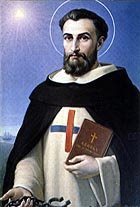
St. John of Matha was born in France. He was a happy, pure boy, who loved God and His Blesses Mother very much. His father sent him to school, and John did well in his studies. As he grew older, many people began coming to him for advice and counsel, and he decided to become a priest so that he could help them more.
When St. John said his first Mass, God showed him that he was to spend his life working to free Christians held as slaves by the Moslems. He founded an Order of priests called Trinitarians to help him in this mission.
St. John’s work was blessed by God, and many Christians were freed. Their Moslem owners were very angry with John. But he was not afraid. In fact, he would have liked nothing better that to die a martyr.
Once, when he was going to Africa to Rome, the Moslems tried to sink the ship on which he was traveling. Holding a Crucifix in his hands, John knelt on the deck and began to pray. Soon the ship reached Rome, unharmed!
St. John died two years later.
By often thinking of the great charity of St. John and his priests, we will find it much easier to do good deeds to our neighbor.

2/7/08
St. Romuald
St. Romuald - February 7th
St. Romuald was an Italian nobleman. As a boy, he had many temptations to impurity. In order to avoid falling into sin, he kept himself busy by going hunting in the woods. When Romuald was twenty years old, he was horrified to see his father kill a man in duel. He went to a Benedictine monastery to do penance for forty days, in reparation for his father’s grave sin. Up until that time, he had lived a lazy life of pleasure, but now at the monastery, Romuald was so moved by the good example of the monks that he decided to become one himself. He asked a good monk named Marino to teach him how to become holy. To test him, Marino treated him harshly. Yet Romuald never complained. Later, he founded the Camaldolese Order and gave all his monks a wonderful example of penance. For a whole year, all he ate each day was a bit of boiled beans. Then for three years, he ate only the little food he grew himself. Through these sacrifices Romuald grew closer and closer to God. A hundred times a day, he would pray in his room: “Oh, my sweet Jesus! God of my heart! Delight of pure souls! The object of all my desires!”
When he was over a hundred, St. Romuald had to suffer very much because he was accused of a very bad sin which he had not committed. He did not become angry or take revenge, even when he was not allowed to say Mass for six months. He could easily have proven that it was all a lie. Yet he chose to suffer for love of God until, at last, Jesus Himself showed everyone that Romuald was innocent.
No matter what happens to us, it will turn out for the best, if we love God and pray to Him.
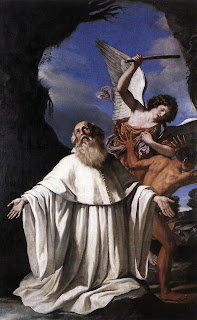
St. Romuald was an Italian nobleman. As a boy, he had many temptations to impurity. In order to avoid falling into sin, he kept himself busy by going hunting in the woods. When Romuald was twenty years old, he was horrified to see his father kill a man in duel. He went to a Benedictine monastery to do penance for forty days, in reparation for his father’s grave sin. Up until that time, he had lived a lazy life of pleasure, but now at the monastery, Romuald was so moved by the good example of the monks that he decided to become one himself. He asked a good monk named Marino to teach him how to become holy. To test him, Marino treated him harshly. Yet Romuald never complained. Later, he founded the Camaldolese Order and gave all his monks a wonderful example of penance. For a whole year, all he ate each day was a bit of boiled beans. Then for three years, he ate only the little food he grew himself. Through these sacrifices Romuald grew closer and closer to God. A hundred times a day, he would pray in his room: “Oh, my sweet Jesus! God of my heart! Delight of pure souls! The object of all my desires!”
When he was over a hundred, St. Romuald had to suffer very much because he was accused of a very bad sin which he had not committed. He did not become angry or take revenge, even when he was not allowed to say Mass for six months. He could easily have proven that it was all a lie. Yet he chose to suffer for love of God until, at last, Jesus Himself showed everyone that Romuald was innocent.
No matter what happens to us, it will turn out for the best, if we love God and pray to Him.

2/6/08
St. Dorothy
St. Dorothy - Patroness of Gardners - February 6th
St. Dorothy was a young and beautiful girl who lived in the city of Caesarea. Both her father and mother died for the Faith. They left her a great deal of money, and Dorothy used it to help the poor people and prisoners. Everyone knew her and loved her for her modesty and piety. She was so beautiful and holy that many young men wanted to marry her. But she has given herself to God alone. So they called her, “The Bride of Christ.”
When Dorothy herself was put in prison for the Faith, the wicked governor sent two young girls named Crista and Callista to persuade her to deny Jesus. There girls had been Christians once. They had given up their Faith when the governor made them many promises and gave them gifts. But these girls could not change Dorothy. It was she who made them cry for their sin and encouraged them to die bravely for Jesus.
Furious, the governor tortured Dorothy, but she would not worship the gods of Rome. “I cannot worship them or the Emperors either,” she said. “I worship only the true God, the Creator of Heaven and earth.” At last, the governor gave up. The saint was getting the best of him, with her wise answers. So he condemned her to death by beheading.
When Dorothy was on her way to be beheaded, a young pagan made fun of her Faith. “Send me some roses and apples from the garden where you are going after you die,” he shouted. Then he laughed cruelly. But St. Dorothy promised that she would. As soon as she died, a child appeared to that pagan carrying three roses and three apples! Where could they have come from? It was not the season for apples and roses! The amazed man realized that the child was an angel come from God and that the flowers and fruit were sent from Heaven. He was converted right then. Soon afterwards, he, too, have his life for God.
Today let us pray especially for someone who is far away from God, so that he will return to our Heavenly Father.
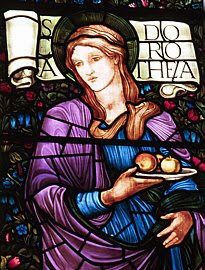
St. Dorothy was a young and beautiful girl who lived in the city of Caesarea. Both her father and mother died for the Faith. They left her a great deal of money, and Dorothy used it to help the poor people and prisoners. Everyone knew her and loved her for her modesty and piety. She was so beautiful and holy that many young men wanted to marry her. But she has given herself to God alone. So they called her, “The Bride of Christ.”
When Dorothy herself was put in prison for the Faith, the wicked governor sent two young girls named Crista and Callista to persuade her to deny Jesus. There girls had been Christians once. They had given up their Faith when the governor made them many promises and gave them gifts. But these girls could not change Dorothy. It was she who made them cry for their sin and encouraged them to die bravely for Jesus.
Furious, the governor tortured Dorothy, but she would not worship the gods of Rome. “I cannot worship them or the Emperors either,” she said. “I worship only the true God, the Creator of Heaven and earth.” At last, the governor gave up. The saint was getting the best of him, with her wise answers. So he condemned her to death by beheading.
When Dorothy was on her way to be beheaded, a young pagan made fun of her Faith. “Send me some roses and apples from the garden where you are going after you die,” he shouted. Then he laughed cruelly. But St. Dorothy promised that she would. As soon as she died, a child appeared to that pagan carrying three roses and three apples! Where could they have come from? It was not the season for apples and roses! The amazed man realized that the child was an angel come from God and that the flowers and fruit were sent from Heaven. He was converted right then. Soon afterwards, he, too, have his life for God.
Today let us pray especially for someone who is far away from God, so that he will return to our Heavenly Father.

2/5/08
St. Agatha
St. Agatha - Patroness of Island of Malta - February 5th
Agatha was a beautiful and holy Christian girl of Sicily. When the governor heard of Agatha’s beauty, he had her brought to his palace. He wanted to make her commit sins against purity, but she was brave and would not give in. “My Lord Jesus Christ,” she prayed, “You see my heart and You know my desire. You alone must have me, because I am yours. Save me from that evil man. Make me worthy of winning out over the devil.”
The governor tried sending Agatha to the house of a wicked women in the hope that she would change for the worse. But Agatha had great trust in God and prayed all the time. She kept herself pure and would not listen to the evil suggestions of that woman and her daughters. After one month, she was brought back to the governor. He tired again to win her. “You are a noblewomen,” he said kindly. “Why have you lowered yourself to be a humble Christian?”
"Even though I am a noble,” answered Agatha, “I am a slave of Jesus Christ.”
“Then what does it really mean to be a noble?” the governor asked.
Agatha answered wisely, “It means to serve God.”
When he saw that she would not sin, the governor had her whipped and tortured very cruelly. As she was being carried back to prison she said, “Lord, my Creator, You have protected me from the cradle. You have taken me from the love of the world and given me patience to suffer. Now receive my soul.” And with that, her beautiful soul went home to Heaven.
Let us learn from this saint to pray with all our heart when we feel tempted to do something wrong.

Agatha was a beautiful and holy Christian girl of Sicily. When the governor heard of Agatha’s beauty, he had her brought to his palace. He wanted to make her commit sins against purity, but she was brave and would not give in. “My Lord Jesus Christ,” she prayed, “You see my heart and You know my desire. You alone must have me, because I am yours. Save me from that evil man. Make me worthy of winning out over the devil.”
The governor tried sending Agatha to the house of a wicked women in the hope that she would change for the worse. But Agatha had great trust in God and prayed all the time. She kept herself pure and would not listen to the evil suggestions of that woman and her daughters. After one month, she was brought back to the governor. He tired again to win her. “You are a noblewomen,” he said kindly. “Why have you lowered yourself to be a humble Christian?”
"Even though I am a noble,” answered Agatha, “I am a slave of Jesus Christ.”
“Then what does it really mean to be a noble?” the governor asked.
Agatha answered wisely, “It means to serve God.”
When he saw that she would not sin, the governor had her whipped and tortured very cruelly. As she was being carried back to prison she said, “Lord, my Creator, You have protected me from the cradle. You have taken me from the love of the world and given me patience to suffer. Now receive my soul.” And with that, her beautiful soul went home to Heaven.
Let us learn from this saint to pray with all our heart when we feel tempted to do something wrong.

2/4/08
St. Jane Valois
St. Jane Valois - February 4th
St. Jane was the daughter of King Louis XI of France. Since the King wanted a son, he was very disappointed when Jane was born. Later, he did not even want her to live at the Palace, because she was very short and deformed. When she was five years old, she was sent away to live with other people.
Jane did not want to marry when she grew up because she has given herself to Jesus and His Most Blessed Mother. Her Father, however, forced her to marry the Duke of Orleans. Jane was a devoted wife for twenty-two years, but after the Duke became King, he sent Jane to live by herself in a far-off township. The Queen did not complain at such unkindness. She exclaimed, instead: “God be praised! He has permitted this that I may serve Him better than I have up until now.”
St. Jane performed many penances and prayed very fervently. She gave all of her money to the poor and founded and Order of Sisters called the Sisters of the Annunciation of the Blessed Virgin Mary.
Let us remember that no matter what a person looks like, what really counts is the goodness in his heart.
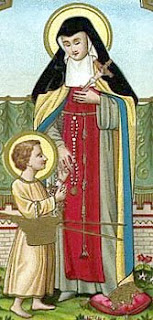
St. Jane was the daughter of King Louis XI of France. Since the King wanted a son, he was very disappointed when Jane was born. Later, he did not even want her to live at the Palace, because she was very short and deformed. When she was five years old, she was sent away to live with other people.
Jane did not want to marry when she grew up because she has given herself to Jesus and His Most Blessed Mother. Her Father, however, forced her to marry the Duke of Orleans. Jane was a devoted wife for twenty-two years, but after the Duke became King, he sent Jane to live by herself in a far-off township. The Queen did not complain at such unkindness. She exclaimed, instead: “God be praised! He has permitted this that I may serve Him better than I have up until now.”
St. Jane performed many penances and prayed very fervently. She gave all of her money to the poor and founded and Order of Sisters called the Sisters of the Annunciation of the Blessed Virgin Mary.
Let us remember that no matter what a person looks like, what really counts is the goodness in his heart.

2/3/08
St. Blaise
St. Blaise - Patron of Throat Ailments - February 3rd
St. Blaise, as a young man, was a doctor, and a very good one. All the sufferings and troubles he saw made him realize that only spiritual joys can make us really happy. He became a priest and then a Bishop. With all his heart, St. Blaise worked to make his people holy and happy. He prayed and preached; he tried to help everyone.
When the Emperor Licinius began to persecute the Christians, St. Blaise was captured and sent to prison to be beheaded. On the way, people crowded the road to see their beloved bishop for the last time. He blessed them all, even the pagans. A poor mother rushed up and begged him to save her child who was choking to death from a fishbone. The Saint prayed and then worked the miracle. This is why St. Blaise is called upon by all those who have throat diseases. On his feast day, we have our throats blessed, and we ask him to protect us from all sicknesses of the throat.
In prison, the saintly bishop converted many pagans. No torture could make him give up his faith in Jesus. Finally he was beheaded and went to be with Jesus forever.
Today let us honor St. Blaise by going without that candy bar or ice cream cone we planned to have.
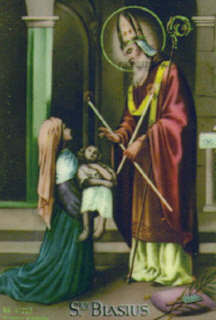
St. Blaise, as a young man, was a doctor, and a very good one. All the sufferings and troubles he saw made him realize that only spiritual joys can make us really happy. He became a priest and then a Bishop. With all his heart, St. Blaise worked to make his people holy and happy. He prayed and preached; he tried to help everyone.
When the Emperor Licinius began to persecute the Christians, St. Blaise was captured and sent to prison to be beheaded. On the way, people crowded the road to see their beloved bishop for the last time. He blessed them all, even the pagans. A poor mother rushed up and begged him to save her child who was choking to death from a fishbone. The Saint prayed and then worked the miracle. This is why St. Blaise is called upon by all those who have throat diseases. On his feast day, we have our throats blessed, and we ask him to protect us from all sicknesses of the throat.
In prison, the saintly bishop converted many pagans. No torture could make him give up his faith in Jesus. Finally he was beheaded and went to be with Jesus forever.
Today let us honor St. Blaise by going without that candy bar or ice cream cone we planned to have.

2/2/08
Purification of the Blessed Virgin
Purification of the Blessed Virgin - February 2nd
Forty days after Jesus was born, Mary and Joseph brought Him to the Temple to be Presented to the Lord; that was the Law of God and they obeyed it perfectly.
While they were in the Temple, Mary also fulfilled another ceremony of the Hebrew Law. After the birth of their children, all mothers were suppose to go to the Temple for the ceremony called the Purification. Our Blessed Mother really did not have to fulfill this ceremony, because she was all pure. She went anyway, to teach us to be humble and obedient.
A holy old priest of the Temple named Simeon learned from God that the Infant Jesus was the Savior. With what joy he held Mary’s Son in his arms! Then inspired by God, he told her that she would have to suffer much. He was talking about the terrible pain our Blessed Mother would feel when Jesus died on the Cross.
The Feast of the Presentation and the Purification remind us that we belong to God, first of all. Because He is our Father and Creator, we owe Him our loving obedience.
In imitation of the Blessed Mother, let us cheerfully obey the rules laid down by our parents and teachers.
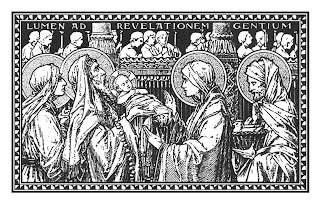
Forty days after Jesus was born, Mary and Joseph brought Him to the Temple to be Presented to the Lord; that was the Law of God and they obeyed it perfectly.
While they were in the Temple, Mary also fulfilled another ceremony of the Hebrew Law. After the birth of their children, all mothers were suppose to go to the Temple for the ceremony called the Purification. Our Blessed Mother really did not have to fulfill this ceremony, because she was all pure. She went anyway, to teach us to be humble and obedient.
A holy old priest of the Temple named Simeon learned from God that the Infant Jesus was the Savior. With what joy he held Mary’s Son in his arms! Then inspired by God, he told her that she would have to suffer much. He was talking about the terrible pain our Blessed Mother would feel when Jesus died on the Cross.
The Feast of the Presentation and the Purification remind us that we belong to God, first of all. Because He is our Father and Creator, we owe Him our loving obedience.
In imitation of the Blessed Mother, let us cheerfully obey the rules laid down by our parents and teachers.

2/1/08
St. Bridget of Ireland
St. Bridget of Ireland - Patroness of Ireland - February 1st
A Few years after St. Patrick arrived in Ireland, there was born a little girl called Bridget. Her father was and Irish lord named Duptace.
As Bridget grew up, she became holier and more pious each day. She loved the poor and would often bring food and clothing to them. One day she gave away a whole pail of milk, and then began to worry about what her mother would say. She prayed to the Lord to make up for what she had given away. When she got home, her pail was full!
Bridget was a very pretty young girl, and her father thought that it was time for her to marry. She, however, had given herself entirely to God when she was very small, and she would not think of marrying anyone. When she learned that her beauty was the reason for the attentions of so many young men, she prayed fervently to God to take it from her. She wanted to belong to Him alone. God granted her prayer. Seeing that his daughter was no longer pretty, her father gladly agreed when Bridget asked to become a Sister.
She became the first Religious in Ireland and founded a convent so that other young girls might become Sisters, When she consecrated herself to God a miracle happened. She became very beautiful again! Bridget made people think of the Blessed Mother because she was so pure and sweet, so lovely and gentle. They called her the “Mary of the Irish.”
Let us not be vain or proud of our appearance. God looks at our heart, not at our face or our clothes!
Subscribe to:
Posts (Atom)
